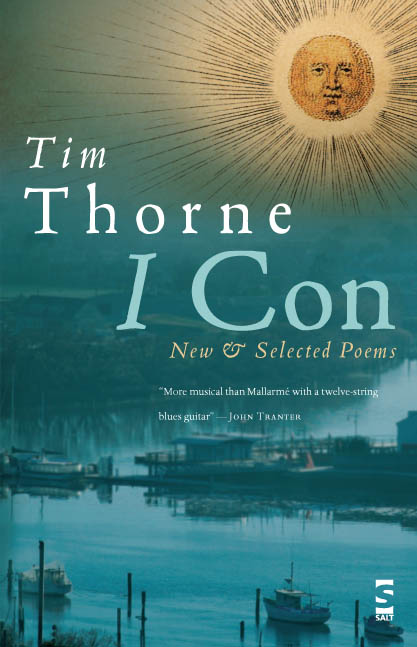 I Con: New and Selected Poems by Tim Thorne
I Con: New and Selected Poems by Tim Thorne
Salt Publishing, 2008
History is a con. Every second year undergrad haunting a uni bar knows that. Understanding history is not who did what to whom when, it is how the narrative reflects on the teller and the audience. I Con: New and Selected Poems, the justly deserved retrospective of Tasmania poet Tim Thorne published in a beautiful hard cover edition by Salt, works its playful magic in the fluid space between fact and myth.
Cons are sharked on all sorts of icons in I Con. Subjects ranges from Seychellois independence ('Song for Seychelles'), to shell-shocked 1950s Australia ('The Atlas') and Kim Hughes's involvement in the rebel tours to South Africa ('Sight Screen'). In 'Erechtheus 33's Apologia' he goes meta responding to Mark Davis's Gangland, the landmark study of the culture wars and the baby boomers who wage them.
Observing the famous William Faulkner pronouncement – 'The past is never dead. It's not even past' – history in Thorne's hands is never dusty. It's a living breathing barfly constantly bickering with a leftover newspaper. I Con contains some of the best Australian political poems of recent years. These modern tales are interwoven with their historical precedents. In the 'Mesopotamian Suite' the code of Hammurabi is evoked:
If anyone bring an accusation of any crime before the elders,
and does not prove what he has charged,
he shall, if it be a capital offence charged,
be put to death.
The logical conclusion circa 2003 is: 'GWB. WMD. QED.' In 'A Letter to Egon Kisch', he uses the story of Kisch, a Czech Jew and Communist activist exiled from Germany in the 1930s, to lambaste the recent revival of Australian jingoism. On a visit to Australia Kitsch was declared persona non grata by the authorities, but then, while he was being deported he jumped overboard, broke his leg and had to convalesce in Australia. The poem puts a blow torch to the totems of this new nationalism including the Australian flag:
The rallying emblem of all racist shits,
surf club neo-Nazis, loser berks
One Nation airheads and like-minded dross
is that Blue Ensign with its Southern Cross
Lacking a time-honoured sobriquet, draped across the shoulders of suburban thugs, the flag becomes 'The Cronulla Cape'. Thorne gets at the 15+ rub of the Cronulla riots:
We lie around on beaches to get tanned,
but underneath the skin what makes us us
is our essential whiteness. Dinkum Aussies
get their dark skins from lying on the sand
wearing not much except the briefest cossies.
Bronzed and bonzer? You don't qualify,
if it comes naturally. You have to try.
The irony is superb – making the poem something of a salve to the modern manifestation of Australia Day as a Southern Cross tattooed celebration of 'White Australia'. It also serves another of Thorne's obsessions: resurrecting the peripheral from the dustbin of history.
Thorne mines art and literature as thoroughly as he mines history. His collective eulogy for John Forbes, Robert Harris and Andrew Hardy, 'Et in Acadia Ego', plays on an inscription found on the tomb of Daphnis in Virgil's Eclogues. It is a reference that regularly reappears in art and literature, gaining prominence in paintings by Nicholas Poussin before hitting the pop culture mother lode in The Da Vinci Code. Thorne, ever the lover of puns, drops the r from Arcadia and, declaring that 'all the best poets be reincarnated', switches the setting to a small town in East Nova Scotia where Harris finds employment as a real estate agent. Tasmanian stencil artist Hardy becomes a Presbyterian Minister who can now:
– strike a pose as snowy and neo-Gothic
as his wooden church and command
the respect denied tagless graffitists
and self-published poets no matter how
much genius is squeezed into the casual smile.
And Forbes gets 'karmic reward' for being 'a healer of the mind' by becoming a GP: 'Dispensing jovial wisdom in a small town / must be a cinch after being a Sydney boy / trying to pick winners in compassionate Melbourne'. This is what Thorne does best – playing the Time Lord shunting history and art into his TARDIS, pressing the buttons, wondering where he will land.
The breadth of content that populates Thorne's poetry makes it ideal for the Age of Wikipedia. Unfamiliar places, phrases or historical events can be Googled – the information recasting the entire poems. At times they feel like the best Simpsons jokes: funny the first time around but the Eureka moment comes later, sometimes years later, when you happen across some innocuous piece of trivia that sheds that finally frames an enigmatic third meaning.
I Con is deeply humorous and rewards re-reading. Many of Australia's greatest poets of the last forty years have been colloquially funny. They have been in tune to jokes cracked in pubs, on building sites and in lecture theatres. Australia is a nation of piss takers and that gives our sense of humour a distinctly egalitarian edge. Perhaps, this is how we have prospered on this unforgiving land. Now it provides a mode for looking at our unforgiving past.









